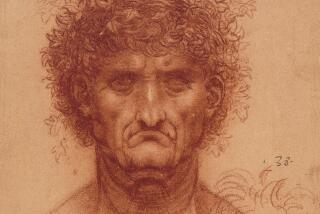Review: Michelangelo Antonioni’s melancholy classic ‘La Notte’ gets a stunning restoration
- Share via
Michelangelo Antonioni was a cinematic cubist. Fragmenting time and space, the Italian master created a potent new language for storytelling, and in the process charted a topography of modern ennui. His work’s glamorously broody visual surfaces might have been mimicked in perfume commercials — they were hardly the only artistic invention to be co-opted by advertising — but no one has quite duplicated the way he built poetic depth from narrative shards. However exquisitely his characters suffer, their search for meaning is real.
Two of the screen’s most melancholic beauties, Jeanne Moreau and Marcello Mastroianni, are the searchers in “La Notte,” which is receiving its first major stateside reissue in more than half a century. The virtuosic 1961 drama is the second film in what’s regarded as a trilogy, beginning with “L’Avventura,” Antonioni’s international breakthrough, and concluding with “L’Eclisse.” Made in quick succession, the three pictures explore disillusion and romantic emptiness, and they all feature Monica Vitti.
In “La Notte,” Vitti’s role is pivotal, but the movie’s protagonist is Moreau’s Lidia, the discontented wife of novelist Giovanni (Mastroianni). He’s the one being feted around town, but she’s the story’s emotional engine, the observer as instigator. Over the story’s nearly 24 hours, from midday to the next morning’s reckoning, her knowing gaze registers the disintegration of the couple’s marriage.
For Antonioni, beginnings and endings aren’t plot points on a narrative graph; they resonate everywhere, entwined and inseparable. A valedictory sorrow suffuses “La Notte.” Opening the film with the central couple’s hospital visit to a dying friend (Bernhard Wicki), the director plunges straightaway into the kind of fraught territory that most films slowly build toward: a head-on confrontation with mortality, not to mention existential questions about purpose and meaning (the friend is also a writer).
Giovanni and Lidia’s visit begins in the coffin-like confines of an elevator and ends with her crying outside the building while he allows himself to be seduced by a deranged patient. His confession to his wife provokes not anger or jealousy, but a supremely detached irony. It’s no wonder that she’ll later wander away from his book-signing party (where Umberto Eco is among the guests), or send him into the arms of a young partygoer (Vitti) when they attend a soiree at an industrialist’s villa.
Lidia’s journeys through Milan and its outskirts are not without incident and yet resound with an aching hollowness. As a solitary perambulator, Moreau has a singular magnetism. A few years earlier, Louis Malle tracked her Parisian wanderings in “Elevator to the Gallows,” but where those scenes were drenched in sex and longing, here she’s driven by their absence. There’s a futility bordering on despair in Antonioni’s interplay of past, present and future, evident in the character’s gestures as well as in the cityscape that surrounds them.
In the midcentury skyline, ubiquitous construction cranes mark the churn of progress. Cinematographer Gianni Di Venanzo (who also worked with Fellini) captures a charged tension between old and new: the ornate and weathered detail of historic structures beside the stark geometry of apartment towers. Rialto Pictures’ restoration more than does justice to the poignant shadows and luster of Di Venanzo’s elegant black-and-white images.
As with any cubist construction, Antonioni’s movie creates something new and unfamiliar from its pieces, and not all of the pieces seem to fit. But the non sequiturs pull the viewer out of the story only to deepen our understanding of the characters — as in Lidia and Giovanni’s visit to a nightclub where a scantily clad contortionist does impressive things with a glass of wine. The couple’s interactions during the bizarre entertainment have a startling intimacy, the actors revealing both tenderness and strain.
That the nightclub performer is black adds another layer of commentary, an acknowledgment of Europe’s colonialist relationship with Africa — a topic that Antonioni would tackle more directly, but no less strangely, in “L’Eclisse.” As in his depiction of the moneyed partiers in “La Notte,” the filmmaker’s social and political commentary is never simplistic, and he never stoops to caricature. In his way, the story’s millionaire host believes in creativity as much as Giovanni does.
But the world is in flux, and the future can look harsh. It’s no coincidence that Vitti’s character, Valentina, is reading “The Sleepwalkers,” a philosophical novel about a world in transition. And it’s not just charming self-deprecation when Giovanni tells his wife, “I no longer have ideas.” Though he may not have a name for it, he feels a part of himself slipping away. He’s the one who still believes in their love, or says he does, but perhaps he’s admitting the self-deception when he tells her what’s left to him: “Only memories.”
-------------
‘La Notte’
In Italian with English subtitles
Not rated
Running time: 2 hours, 2 minutes
Playing: Laemmle’s Royal, West Los Angeles
See the most-read stories in Entertainment this hour »
Movie Trailers
More to Read
Only good movies
Get the Indie Focus newsletter, Mark Olsen's weekly guide to the world of cinema.
You may occasionally receive promotional content from the Los Angeles Times.










